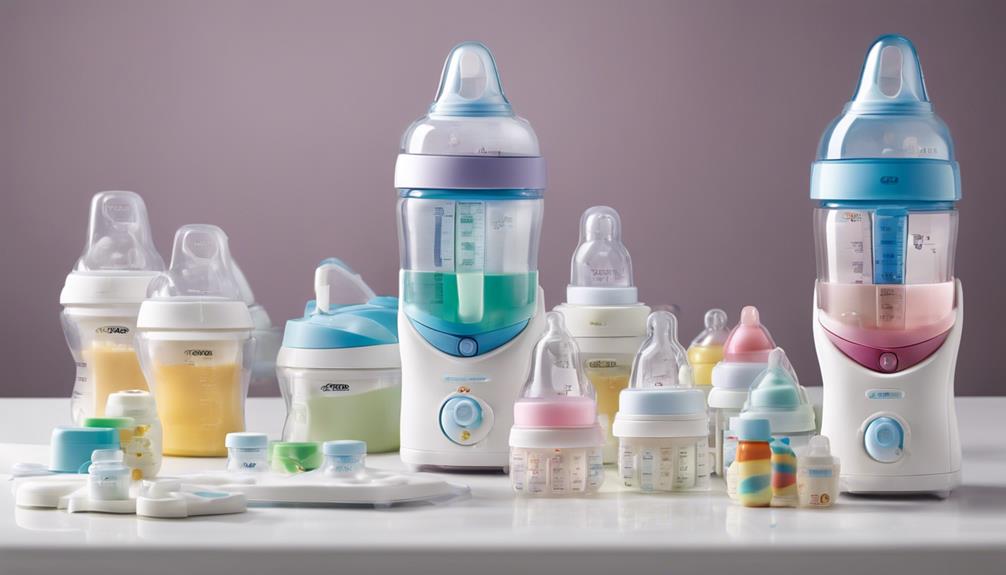Have you ever considered adjusting formula feeding as your baby grows?
We explore the nuances of feeding formulas at different ages, offering insights into the intricacies of each stage.
From newborns to toddlers, understanding the changing needs and requirements is essential for a well-nourished and healthy baby.
Stay tuned to uncover the secrets of excellent formula feeding practices at every developmental milestone.
Key Takeaways
- Start with small amounts and gradually increase based on age and weight.
- Monitor feeding cues and adjust amounts to meet nutritional needs.
- Transition to toddler formula after 12 months for essential nutrients.
- Follow guidelines for formula preparation, storage, and feeding practices.
Newborn Formula Feeding Guidelines
When starting newborn formula feeding, it's imperative to follow guidelines that cater to their specific nutritional needs and growth requirements. Newborns typically begin with 1 to 2 ounces of formula every 2-3 hours, gradually increasing to 2 to 3 ounces every 3-4 hours as they grow.
It's essential to feed on demand, responding to hunger cues like smacking lips or fussiness to make sure they receive adequate nourishment. The formula feeding chart suggests offering approximately 2.5 ounces per pound of body weight every 24 hours for newborns.
Monitoring their formula intake is vital for their development, with signs of sufficient intake including steady weight gain and the presence of 5-6 wet diapers daily. By adhering to these newborn guidelines, we can support their healthy growth and overall well-being.
Formula Feeding for Infants

Discussing the nutritional needs of infants, formula feeding plays an important role in providing essential nutrients for their growth and development. When it comes to feeding your baby, there are key points to take into account:
- Amount and schedule: Newborns typically start with 1 to 3 ounces of formula per feeding, progressing to 2 to 3 ounces every 3-4 hours as they grow.
- Monitoring intake: It's vital to monitor the amount of formula your baby consumes, aiming for around 2.5 ounces per pound of body weight every 24 hours.
- Weight gain: Adequate formula intake leads to healthy weight gain in infants. Look for steady weight gain and 5-6 wet diapers daily as positive indicators.
- Signs of overfeeding: Keep an eye out for signs of overfeeding such as vomiting or tummy pain, and address them promptly to guarantee your baby's well-being.
Ensuring your baby receives the right amount of formula is essential for their growth and development. Remember to consult with healthcare professionals for personalized advice tailored to your baby's needs.
Toddler Formula Feeding Tips
Shifting toddlers to toddler formula can be a beneficial way to provide essential nutrients for their growth and development after 12 months of age. Toddler formula is formulated to provide important nutrients like iron, calcium, and vitamin D, supporting the needs of growing toddlers. It's essential to follow recommended serving sizes and guidelines when incorporating toddler formula into their diet to prevent overfeeding and make certain they receive the right balance of nutrients.
For picky eaters or toddlers with dietary restrictions, toddler formula can be a convenient option to bridge nutritional gaps. However, before making any changes, it's advisable to consult with a pediatrician. A pediatrician can offer personalized advice based on your child's specific nutritional needs, making certain that toddler formula is a suitable addition to their diet.
Formula Feeding Dos and Don'ts

Consulting a pediatrician for personalized formula feeding recommendations is essential for ensuring the proper nutrition and well-being of your infant. When it comes to formula feeding dos and don'ts, here are some important points to keep in mind:
- Do: Follow proper storage guidelines to maintain formula freshness and quality.
- Don't: Dilute formula beyond the recommended ratios for baby's safety.
- Do: Clean and sterilize feeding equipment regularly to prevent bacterial contamination.
- Don't: Heat formula in the microwave as it can create hot spots that may burn the baby.
Age-Appropriate Formula Intake
When determining the appropriate formula intake for infants at different ages, it's important to take into account their specific nutritional needs and developmental stages.
Newborns typically consume 2 to 2.5 ounces of formula per pound of body weight every 24 hours.
For infants aged 1 to 3 months, around 4 to 5 ounces per feeding every 3 to 4 hours is generally recommended.
As babies grow to 4 to 6 months, they may require 6 to 7 ounces per feeding, with 4 to 5 feedings each day.
At 7 to 9 months, babies usually need 6 to 8 ounces of formula per feeding, 3 to 4 times daily.
From 10 to 12 months, babies tend to consume 7 to 8 ounces of formula per feeding, also 3 to 4 times daily.
It's essential to adjust the feeding schedule and amounts based on the age-appropriate intake to make sure they meet their growing needs, especially during growth spurts.
Frequently Asked Questions
How Much Formula Do You Give at Each Age?
We give varying amounts of formula at each age: 1-3 months, 2-4 ounces; 4-6 months, 4-6 ounces; 7-9 months, 6-8 ounces; 10-12 months, 8-10 ounces. These quantities support the nutritional needs and growth of babies as they develop.
What Age Should You Stop Formula Feeding?
We stop formula feeding around 1 year when our little one becomes a milk connoisseur! Remember, balance is key – follow pediatric guidelines, monitor baby's cues, and consult with experts for a smooth switchover.
Is It OK to Strictly Formula Feed?
Yes, it's okay to strictly formula feed. Modern formulas are designed to provide complete nutrition. Consulting a healthcare provider guarantees proper selection and feeding practices. We've found it convenient and reliable, allowing other caregivers involvement.
Is Only Formula Feeding Ok?
Only formula feeding is perfectly acceptable for babies. It provides essential nutrients important for growth. We consulted with experts and found no issues. Choose quality formula, consult professionals, and watch your baby prosper.
Conclusion
To conclude, formula feeding at every age requires careful attention to the needs of the growing baby. By following the guidelines provided in this detailed guide, parents can guarantee proper nutrition and development for their little ones.
Remember, just like a well-balanced formula, a well-informed caregiver is crucial for a healthy and happy baby.
So, let's continue to nourish and nurture our babies with love and care, one feeding at a time.










